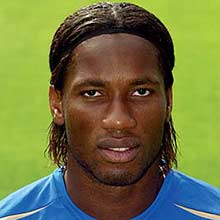
After a gentle-paced start to his career in France, Didier hit full sprint after his move to the big time at Marseille where his stunning form and goalscoring helped his club to the 2004 UEFA Cup Final and himself to the France Footballer of the Year Award.
And sprinting plays a big part in the big man's armoury; his pace allied to strength making Didier the type of forward not seen at Stamford Bridge for a long, long time. He also possesses aerial power in front of goal that at times borders on awesome.
Signed for Chelsea in the summer of 2004, Didier's transfer fee makes him the second most expensive striker in British football history, only surpassed by the money paid by Man United for Wayne Rooney.
The man who has spearhead the Ivory Coast to a first World Cup Finals moved from Africa to live in France as a young child and played his early junior football at right-back. He dabbled with various small clubs and even turned down the chance of a trial at Paris Saint-Germain, preferring to learn his trade before attempting the big time.
He did that at Second Division Le Mans before moving up a division to Guingamp whom injury had prevented him joining some years earlier. It was during this spell in Brittany that Didier first came to the attention of Jose Mourinho but after scoring 17 goals in 2002/3 and becoming an international, he had moved out of Porto's price range. Olympique Marseille swooped and they did not regret their move.
Two seasons ago, Didier's second at l'OM, he netted 18 times in 35 league games and six times in the UEFA Cup including braces against Liverpool and Newcastle. FIFA recognised the achievements with a nomination for World Player of the Year.
A groin operation forced him out for most of October and November of his first season at Chelsea and it took some time for him to reach full power again. But Didier scored in the Carling Cup Final and the man asked to fill the central position in the front three netted ten times in the Championship winning campaign and 16 times in all competitions.
Player Info:
Number: 15
Date of Birth: 11 Mar 1978
Career Signed in Chelsea: 20 Jul 2004
Previous clubs: Le Mans, Guingamp, Marseille
(Chelsea site)
